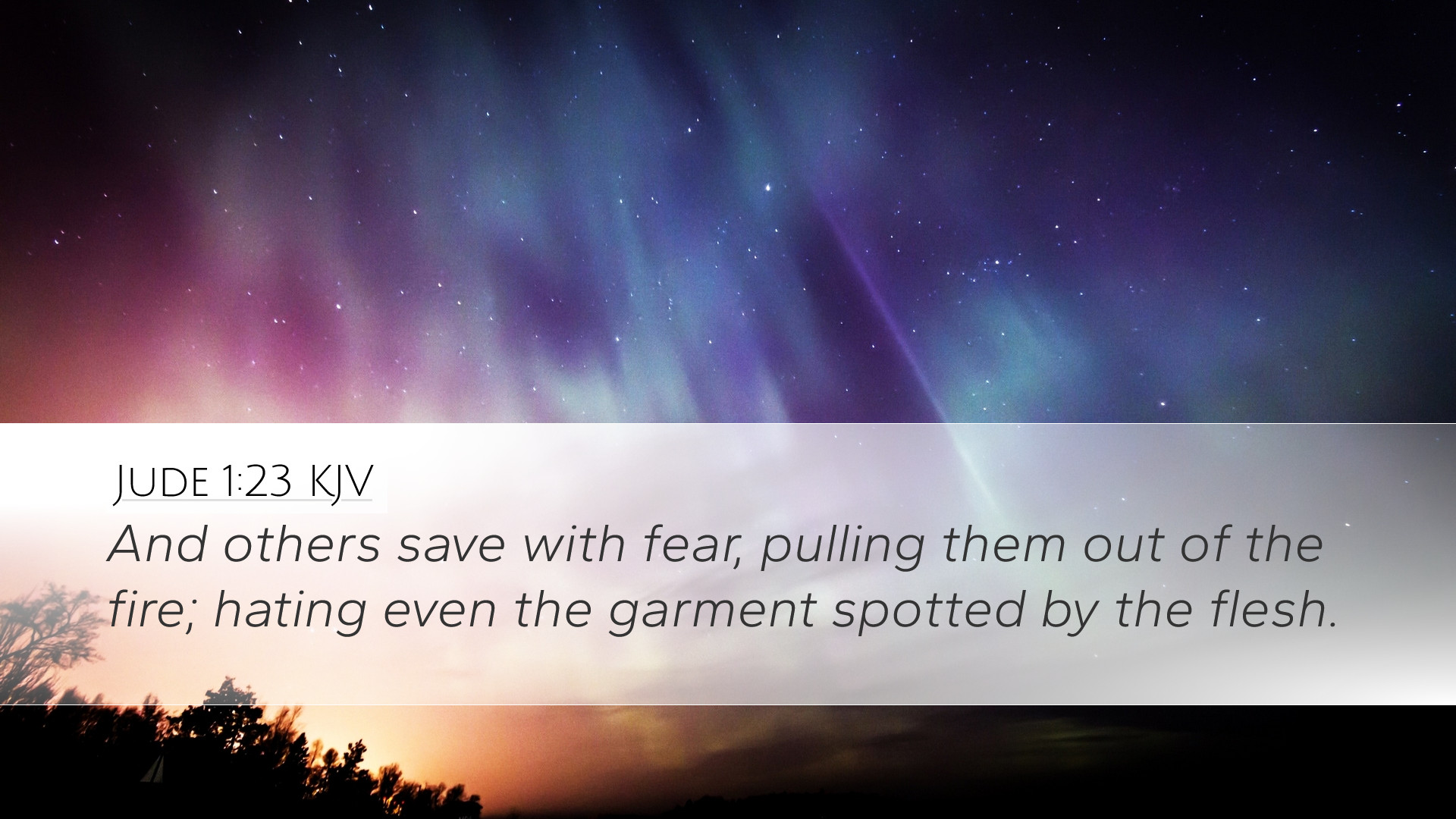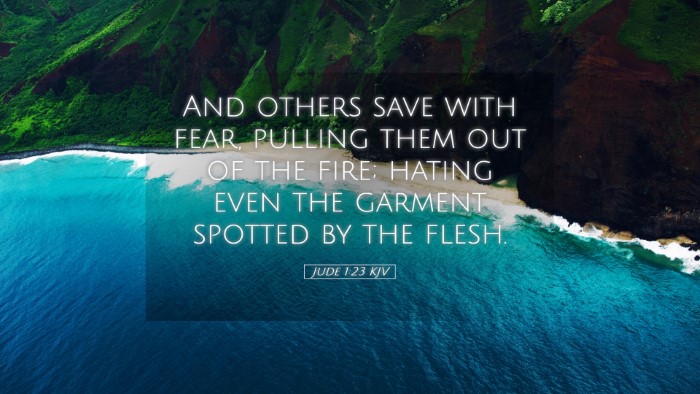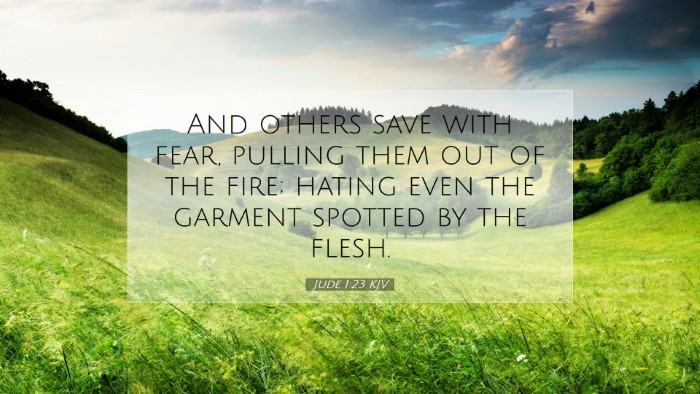Commentary on Jude 1:23
Jude 1:23 (KJV): "And others save with fear, pulling them out of the fire; hating even the garment spotted by the flesh."
Introduction
The epistle of Jude is a potent call to defend the faith and a warning against false teachings. In verse 23, Jude directs a crucial message regarding the attitude believers ought to have towards those who are misled. The phrase "save with fear" encapsulates an urgency and seriousness in rescuing those who stray from the truth. This commentary draws insights from renowned public domain commentaries to expound upon the theological and practical implications of this verse.
Contextual Analysis
According to Matthew Henry, the broader context of Jude addresses the perils of apostasy and the importance of steadfastness in faith. The letter is directed to believers as a plea to contend earnestly for the faith. Jude highlights the need for discernment among the faithful, especially when regarding those who have been tainted by false teachings.
Henry emphasizes that the urgency of calling others to salvation is rooted in a love for God and a recognition of the dangers inherent in falsehood. This understanding is critical when interpreting verse 23 and its exhortation to "save with fear."
The Importance of Fear in Salvation
Albert Barnes furthers the exposition by dissecting the phrase "save with fear." He posits that 'fear' is not merely a reaction but a necessary component of approaching spiritual rescue. This fear is characterized by a deep reverence for God, an awareness of the seriousness of sin, and an understanding of the eternal consequences of rejecting salvation.
Barnes connects this fear explicitly to the gravity of sin that leads to divine judgment. He suggests that while the message of grace is paramount, a healthy fear of God’s judgment can be a profound motivator for both the seeker of truth and the believer guiding them. This duality of fear—both reverential and apprehensive—is essential in a complete understanding of the salvific process.
"Pulling Them Out of the Fire"
Jude’s metaphor of "pulling them out of the fire" vividly represents the urgency and necessity of active engagement in spiritual rescue. Adam Clarke interprets this as a direct call to action; believers are not to be passive observers but proactive agents in reconciliation. Clarke highlights that this imagery implies an imminent danger—similar to an individual being rescued from a literal fire, time is of the essence in addressing their peril.
Furthermore, Clarke considers this as indicative of the believer's role in intercessory work and evangelism. It is a reflection of the Christian duty to care for others, not just spiritually, but also emotionally and physically. Clarke's commentary elucidates the necessity for the church to take an active role in combating the moral and spiritual decay in society.
Hating the Garment Spotted by the Flesh
The concluding part of the verse mentions, "hating even the garment spotted by the flesh." This striking imagery serves to emphasize the deep disdain one should have for sin. Matthew Henry interprets this as a reminder that believers should not only seek to help others but must also aspire to a holiness that shuns the corruptions of sin in their own lives.
Henry elaborates that this line reflects the steadfast need for purity, suggesting that an individual’s righteousness influences their witness to others. The implications are that one must be cautious not to engage in behaviors that might compromise their ability to rescue others. Clarke reinforces this idea by suggesting that the garments represent the outer manifestations of sin that can corrupt both the individual and those around them.
Practical Implications for Ministry
This verse presents significant implications for those in ministry. Pastors and spiritual leaders are admonished to engage with those they seek to help authentically and compassionately, blending love with an understanding of the weight of sin. In light of this, Jude calls the faithful not simply to save but to do so with an awareness of the seriousness of the situation.
- Compassionate Urgency: Ministries should operate with a sharp awareness of the consequences of sin, driving their urgency in evangelism and discipleship.
- Holistic Care: Engage and support individuals spiritually, emotionally, and physically in their journey towards salvation.
- Holiness in Witness: Maintain personal integrity, recognizing that individual holiness influences collective faith.
- Discernment: Develop a discerning heart that can identify areas of conflict regarding faith and guide others away from falsehood.
Conclusion
Jude 1:23 encapsulates a lifestyle of vigilance and compassion in the life of a believer. Drawing upon the insights of Matthew Henry, Albert Barnes, and Adam Clarke, it is evidenced that the call to "save with fear" is both a theological imperative and a practical one. Believers are to be ardent in their efforts to rescue those who teeter on the brink of eternal peril, all while fostering an environment of love, truth, and holiness.
As pastors, students, theologians, and Bible scholars reflect on this verse, may they be invigorated to engage more deeply in their mission to reflect Christ’s love while acknowledging the seriousness of sin and its effects on the world.


